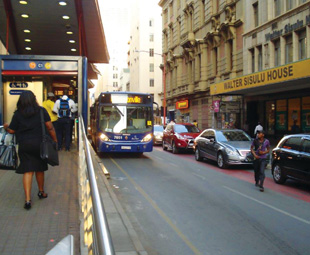Transport IQ

It would seem that those running our public transport systems, and indeed our cities, have no regard for public transport at all
I have two things in common with Vusi Mona of South African National Roads Agency (Sanral) fame. Apart from sharing the same initials, I agree with him that the average South African needs to be told to “raise your IQ a little bit”. He has been roasted for this, but, if we stop to think about it, by doing so we could have avoided many problems in public transport by now. But I suggest that his remarks should first be aimed at government and only then at ordinary citizens.
The last week of November 2013 wasn’t a good one for bus rapid transit (BRT) in Johannesburg. Two disruptions took place, both with fairly serious implications.
The first was on Wednesday, November 27. After getting off a Soweto-bound BRT bus at Bosmont Station at 16:10, I noticed several other buses facing the same way, but parked in the second bus lane, with engines running and still carrying passengers. My bus pulled forward and then reversed into the second lane to join the others. BRT staffers were running around with walkie-talkies and cellphones glued to their ears.
It transpired that a “service delivery” protest was taking place at Pennyville, about two kilometres further along the route, on the northern fringe of Soweto. The protesters had blocked the busway with stones, and some stone-throwing had also taken place. Apparently the protest had nothing to do with BRT but the protesters were using it to make whatever points they had in mind.
The BRT service in the opposite direction had been suspended at Orlando Stadium, so my intended return to the University of Johannesburg (UJ) on BRT was clearly not going to happen. After 40 minutes of waiting, I decided to walk to Longdale Railway Station in order to catch a train to Braamfontein and then transfer to a Metrobus to get me back to UJ.
The second, more serious, incident took place two days later on November 29. Friday afternoons are noted for gridlock in the Johannesburg CBD, but this one was the worst I have seen in thirty years. Again, I was in a BRT bus. It took 55 minutes to travel from Park Station to the City Hall, a distance of about 1 500 metres. At one stage we did not move for nine minutes. The traffic police were in evidence but stood around joking with motorists and minibus-taxi drivers – they could do nothing to keep the traffic moving.
All the other passengers got out and walked, but I stayed in the bus for no other reason than to be able to write about it in this column. The hold-up made the front page of the next day’s Saturday Star which showed pictures of former president Thabo Mbeki walking along the street and greeting passers-by, having had to leave his blue-light convoy and finish his journey on foot!
What can we learn from all this? First, neither the Gauteng Province nor the ANC-run Johannesburg City Council cares much about BRT or, for that matter, public transport in general. Every weekday for more than four years now, officials of the ruling party have parked their cars in the double BRT lane outside Walter Sisulu House, the provincial headquarters of the ANC. If they were serious about public transport they would park their cars on the fringe of the CBD and come to meetings on BRT – but instead they give BRT the middle finger. These cars seem to be immune from prosecution … So, anything the Gauteng Province or the Johannesburg City Council says about fixing public transport can be treated as hypocrisy.
Second, when problems arise, no attempt is made to turn BRT buses short or to divert them. With the first incident other buses, such as Putco and Metrobus, were diverted along Main Reef Road and at least kept moving, but BRT remained stuck (like our badly-managed trolleybuses of old during a power failure).
On Friday 29, too, buses could have been turned short of the CBD and passengers told to walk to fringe stations such as Westgate and Park Station.
Poor communication with passengers has become a feature of BRT. Although station staff and drivers have cellphones, no one was able to tell passengers what was going on. On both days, passengers were simply left in the bus and, when they had had enough, they had to leave the bus by the left-hand door thereby incurring penalties when they re-entered the system later. This has happened to me on more than one occasion.
So, let’s listen to Vusi – start working on our IQs! But can we expect our leaders and authorities to do so first? Appointing a public transport user to the board of Sanral would be a start.
Vaughan Mostert is a senior lecturer in the Department of Transport and Supply Chain Management at the University of Johannesburg. He developed a love for public transport early in life, which led to a lifelong academic interest in the subject. Through Hopping Off, Mostert leaves readers with some parting food for thought as he continues his push for change in the local public transport industry.
Published by
Focus on Transport
focusmagsa




